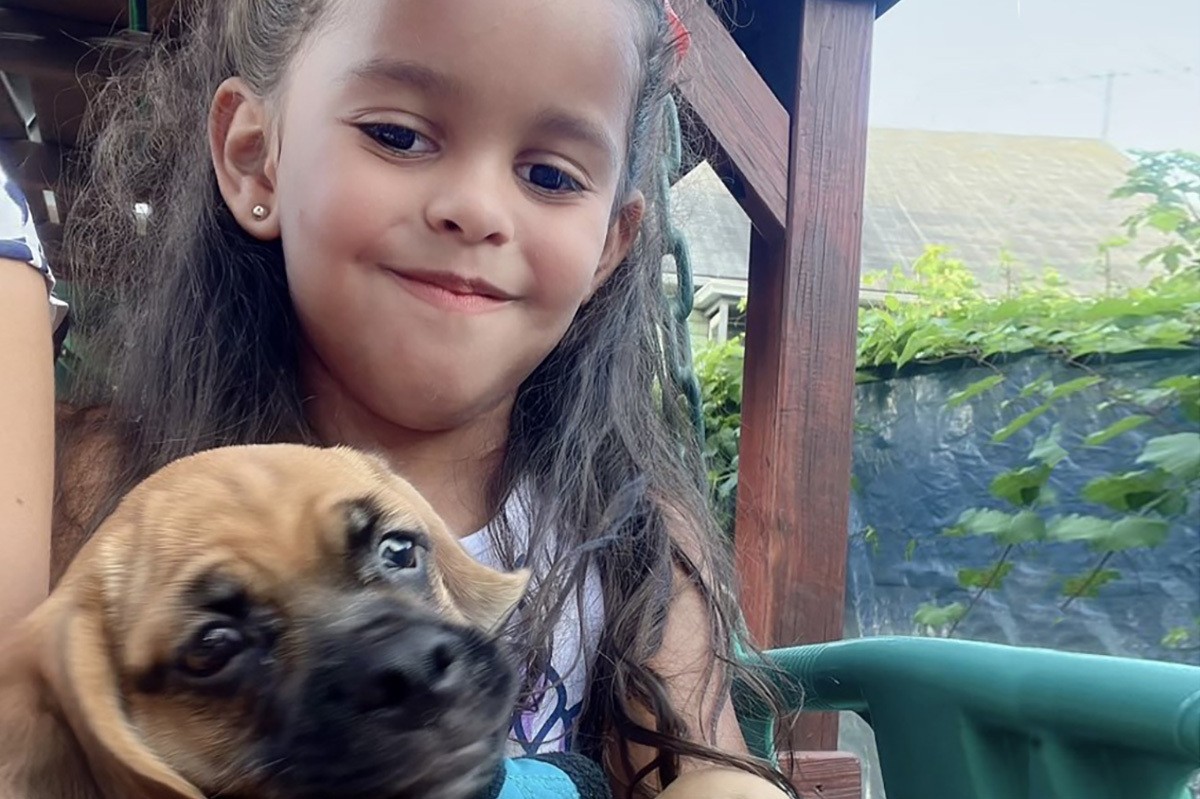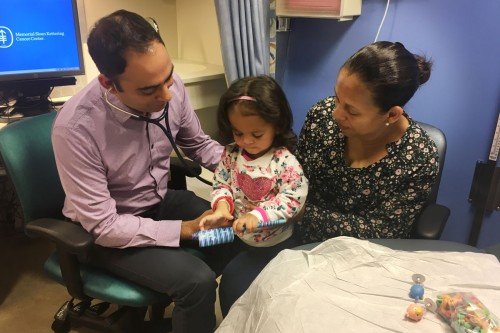
The first day of kindergarten is a big day for every child’s family. But for Ana, it’s a day she worried would never come. Her daughter, Rihanna, has been a patient at Memorial Sloan Kettering Cancer Center (MSK) since she was a baby. Her groundbreaking treatment made history and led to a new approach to fighting cancer. Rihanna’s sweet face even appeared on a Times Square billboard.
However, at this moment — thanks to the expertise in precision medicine of MSK’s pediatric program, MSK Kids, — Rihanna’s just a 5-year-old excited to start school and play with her new puppy, Bentley, who was named for the hotel where her family stayed during her treatment.
Now cancer free, Rihanna represents the power of combining state-of-the-art diagnostics and therapies at MSK Kids, the largest pediatric oncology program in the country. Her life was saved by the team of disease detectives working in the Pediatric Translational Medicine Service (PTMS), bringing together specialists in pediatrics, pathology, and clinical genetics to find the genes driving cancers in children and adolescents — and the drugs that can stop them.

“Children like Rihanna show the promise of genetic testing for children with cancer,” says geneticist and pediatric oncologist Michael Walsh. “We are learning more everyday about the genes that drive cancer, so we can match more children to precision treatments that spare them harsh side effects. We are also identifying potential vulnerabilities to additional cancers that require screening. All of this knowledge can enable our patients to grow up and lead full, happy lives.”
Discovering the Pediatric NTRK Genetic Mutation Causing Cancer
Rihanna was born with a tumor the size of her head on her right arm. Ana and her husband, Enrique, were devastated and overwhelmed. After chemotherapy at their local hospital failed to shrink the tumor, Rihanna’s doctors wanted to amputate her arm. Ana and Enrique knew there had to be a better option. They brought her to MSK.
The Service Chief for the PTMS, pediatric oncologist Neerav “Neal” Shukla, became Rihanna’s doctor. The team determined that Rihanna’s cancer was caused by a mutation in a gene called NTRK and focused her care plan on attacking the cancer-driving effects of that mutation.
At the time, Dr. Shukla was leading a clinical trial for larotrectinib (Vitrakvi®), a drug that specifically targets NTRK. It was still an experimental medication, and Rihanna would be the first child at MSK to take it. But her doctors and her family agreed it was their only hope of giving her a normal life.
“I don’t think we really even thought twice about it,” Ana says. “The doctors said: ‘I studied this. I do this all day long.’ I wanted someone confident.”
The family’s bravery paid off: Within weeks, larotrectinib had shrunk the tumor small enough so Rihanna could have it surgically removed and maintain use of her right arm. She had minimal side effects and, before long, was back to being a happy, bouncy baby.
Five years later, Rihanna is a spunky little girl who loves to cook, play dress-up, and do math puzzles. After skipping a level of pre-K, she’s starting kindergarten earlier than expected.
How Genetic Testing Led to a Groundbreaking Medication for the NTRK Gene
The drug given to Rihanna is considered a breakthrough because it goes after a genetic mutation that can show up across different types of tumors originating in different parts of the body. Moreover, this NTRK mutation is present in both pediatric and adult cancers. Thanks to testing called MSK-IMPACT® and MSK-Fusion, specialists can pinpoint exactly where this — or other mutations — might be hiding. This advanced diagnostic tool is a standard part of every child’s care at MSK Kids.
“The vast majority of other institutions don’t have the breadth of sequencing that we can do internally,” says Dr. Shukla. “What we have is really unique.”
In a landmark moment for cancer treatment, larotrectinib was approved by the FDA in 2018 for both adults and children with NTRK-driven tumors.
New Type of Genetic Testing Aims To Benefit More Children and Young Adults With Cancer
The genetic mutation in Rihanna’s cancer was detected by MSK-IMPACT, which can reveal mutations in 500-plus genes related to cancer.
But for other children and young adults with cancer, the standard MSK-IMPACT genetic testing has not been as useful for matching patients to appropriate therapies. That’s because, as researchers are coming to realize, the mutations that drive tumors in young patients tend to be different. Finding them demands “whole genome sequencing” — analyzing the billions of DNA letters making up an entire genome and finding the clinically relevant information to help doctors make a treatment decision.
That kind of whole genome testing has been time-consuming and expensive. But this spring, MSK Kids researchers published a study in Nature Communications, reporting on the performance of a whole genome sequencing platform that they believe solves these challenges.
“What we’re trying to do is to bring a more comprehensive approach to pediatric patients and others with rare cancers,” says pediatric oncologist Andrew Kung, Chair of the Department of Pediatrics at MSK Kids. “We want to make precision medicine more inclusive, including for patients with rare tumors that are not driven by the kind of mutations found by routine genetic testing.”
‘This Is a Miracle. Now You Get To Help Others.’
Rihanna is starting to piece together small memories about her time at MSK Kids. Her surgical scar tells her incredible story, although sometimes Rihanna wished it didn’t.
“She says, ‘Mom, I don’t want my arm like this,’ ” Ana says. “We tell the truth — she had a disease, and it needed to be removed. We put it the same way that we took it: ‘This is a miracle. Now you get to help the others.’ We wanted to testify that the science works.”
Rihanna’s care has shifted to MSK Kids’ pediatric long-term follow-up program, and if all looks good, she will soon only need annual checkups. She’s comfortable and confident during her visits to MSK Kids. Whenever she goes for an MRI test, she tells her mom, “I got this.” She always makes time to say hi to Dr. Shukla, who says he’s thrilled to see Rihanna thriving. “She’s boisterous, funny, and very active,” he says.
Like all kindergartners, Rihanna thinks about what she wants to be when she grows up. Her current dream job is a chef, but she’s also considering being a doctor, nurse, or police officer.
All those paths and more are open to her, thanks to her care team, the power of genetic testing, and the lifesaving drug that changed cancer treatment.
In the meantime, Rihanna loves playing with Bentley — a happy reminder of how far she’s come.
